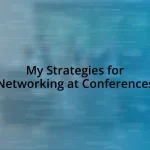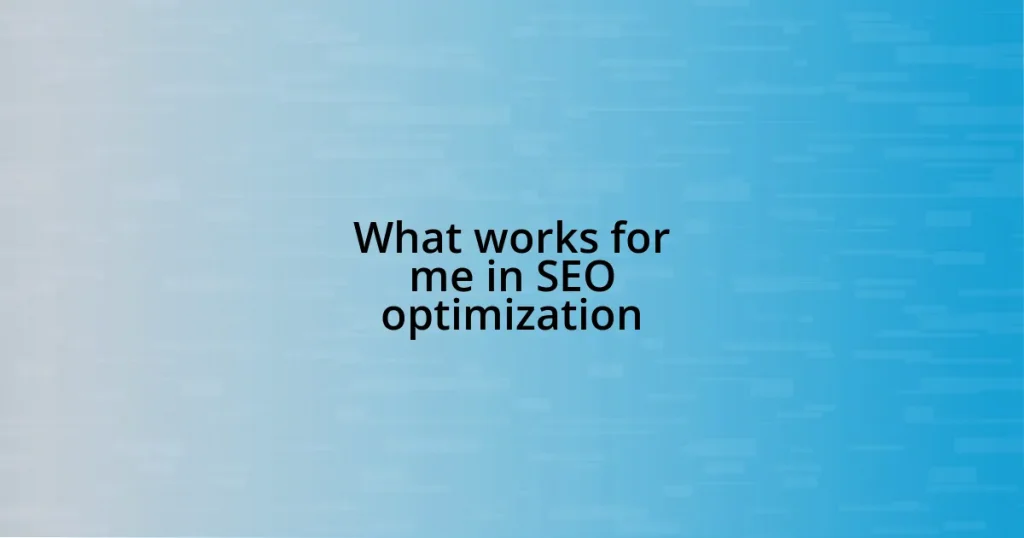Key takeaways:
- Mentorship programs connect experienced professionals with mentees, providing clarity and support for professional growth.
- Finding a mentor builds meaningful relationships that offer accountability, confidence, and new perspectives.
- Mentorship fosters personal growth by encouraging individuals to embrace challenges and develop essential soft skills.
- Post-mentorship action is crucial for translating guidance into results, emphasizing the importance of setting goals and maintaining flexibility.
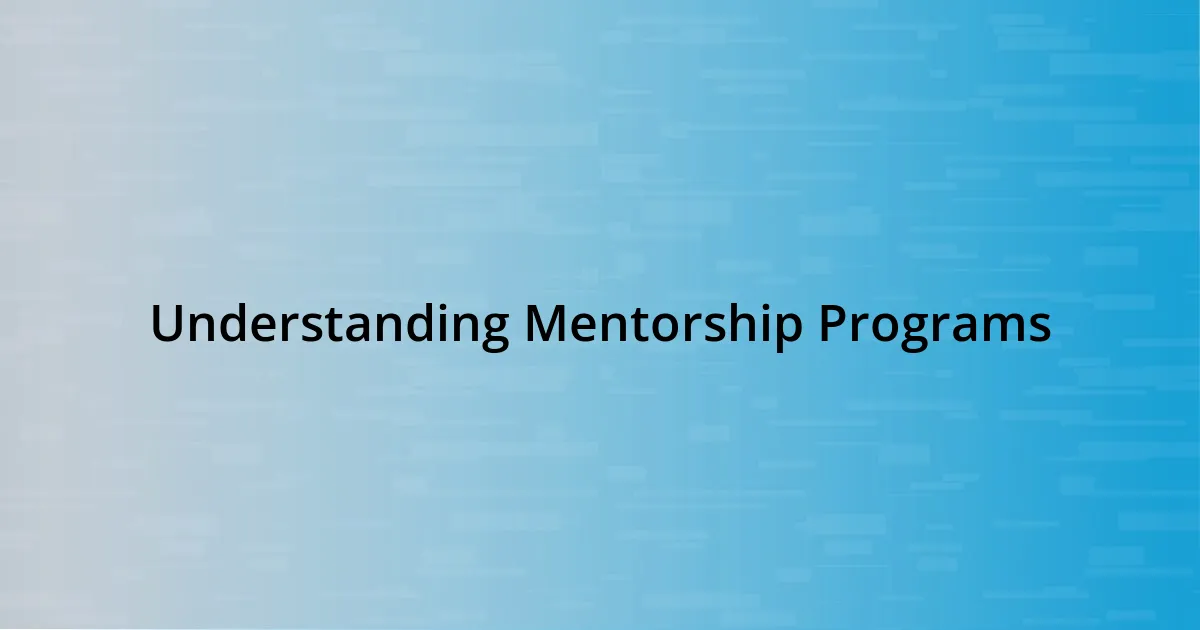
Understanding Mentorship Programs
Mentorship programs serve as bridges between experience and ambition, connecting seasoned professionals with those eager to learn. I remember my first mentorship experience; the mentor was approachable and genuinely interested in my growth. I often wonder, how transformative could a single conversation be in shaping someone’s career path?
These programs typically involve one-on-one interactions, where mentors share their knowledge, skills, and insights. Reflecting on my own journey, I could see how their guidance helped me navigate complex situations. Have you ever faced a dilemma at work and thought, “If I only had someone to turn to?” That’s exactly what mentorship provides—clarity.
Moreover, mentorship programs foster a safe space for learning and growth. I cherished the vulnerability I felt when discussing my challenges; it was liberating to realize I wasn’t alone. Does the idea of having someone to confide in, who understands your struggles, resonate with you? It’s that connection that makes the mentoring experience invaluable, leaving a lasting impact on both the mentee and mentor.
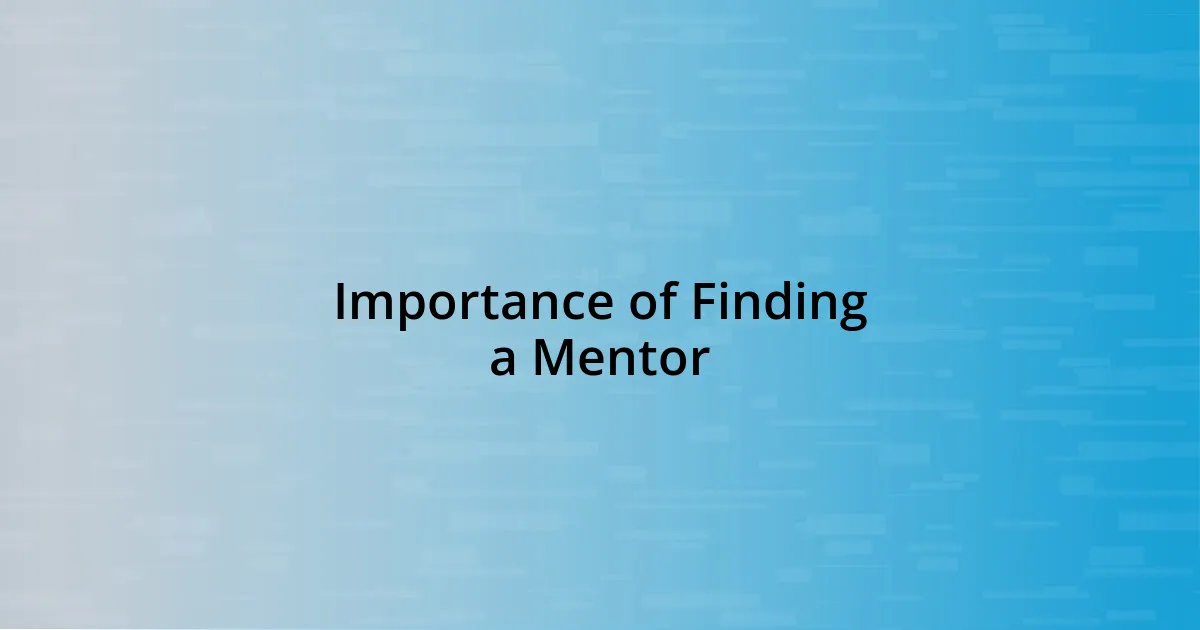
Importance of Finding a Mentor
Finding a mentor is more than just a networking move; it’s about building relationships that can have profound effects on your professional journey. I remember the day I met my mentor in a casual coffee shop; something as simple as that space made it feel comfortable to share aspirations, fears, and dreams. It’s incredible how a candid conversation can illuminate paths you never considered before.
Mentors often provide perspectives that outside eyes could miss. Reflecting on past projects, my mentor helped me recognize patterns in my work and pointed out strengths I didn’t know I had. That moment when I realized my potential was eye-opening—has there ever been someone who recognized something in you that you overlooked? Truly, this kind of awareness can elevate your confidence and decision-making.
Additionally, having a mentor creates accountability. I recall setting goals with mine, and knowing someone was checking in on my progress encouraged me to stay committed. It’s like having a personal cheerleader, urging you forward while holding you responsible. Doesn’t that sound like the perfect blend of support and motivation to achieve your goals? A mentor transforms the often lonely path of professional development into a shared experience.
| Mentor Benefits | Personal Growth |
|---|---|
| New Perspectives | Confidence Building |
| Accountability | Career Guidance |
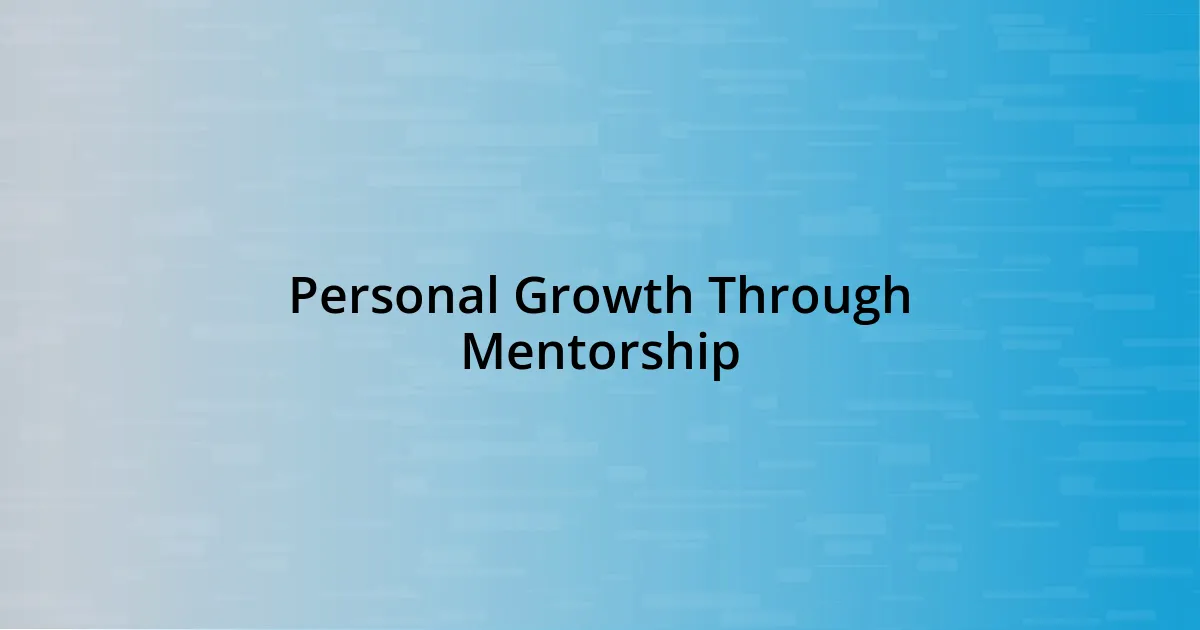
Personal Growth Through Mentorship
Mentorship has a unique way of propelling personal growth in ways I never anticipated. For instance, during one session, my mentor urged me to step out of my comfort zone and take on a leadership role in an upcoming project. Initially, fear gripped me, but his unwavering belief sparked a hidden resilience. Looking back, I realize that push was a turning point; taking on that role enhanced my skills and boosted my self-esteem dramatically.
- Through mentorship, I learned the importance of embracing challenges.
- I developed the ability to articulate my ideas clearly.
- My mentor’s insights helped me cultivate emotional intelligence, enabling me to connect with colleagues better.
Each of these lessons became stepping stones in my personal journey, reshaping how I perceive my capabilities and approach new tasks. Mentorship isn’t just about receiving advice; it’s a transformative experience that encourages you to evolve as a person.
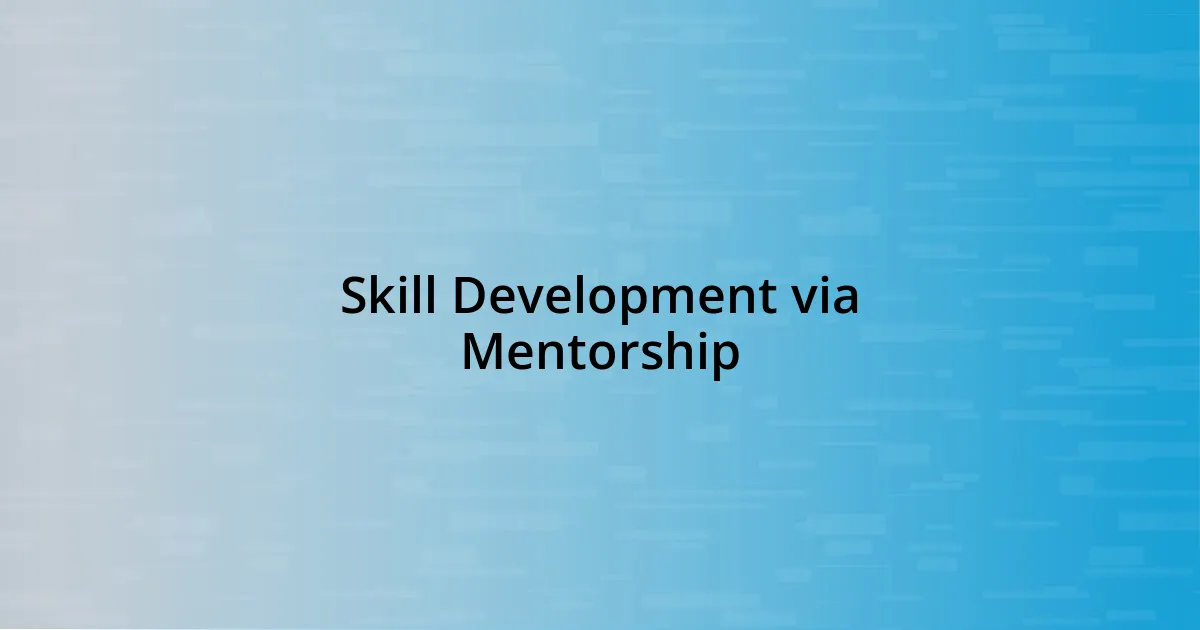
Skill Development via Mentorship
Skill development through mentorship is an enlightening journey that often surpasses our initial expectations. I recall working with a mentor who challenged me to master new software that felt entirely foreign to me. At first, I was intimidated, but with his patient guidance, I not only learned how to navigate the tool but also discovered a love for technology that I never knew I had. Have you ever stumbled upon a passion while learning a new skill?
Mentorship also creates a safe space for exploring and refining skills. I remember presenting a project proposal to my mentor. Instead of just critiquing my ideas, he encouraged me to view feedback as an opportunity for growth. This approach shifted my mindset—rather than fearing criticism, I began to embrace it as a vital part of honing my abilities. Have you experienced a moment where constructive feedback turned into a growth catalyst for you?
Moreover, mentors help refine soft skills, which are as crucial as technical proficiencies. I often found myself in situations where communication was key, and my mentor worked closely with me on developing that skill. Through role-playing scenarios, I learned to convey my thoughts more effectively and listen deeply to others. It was during these sessions that I truly understood the power of effective communication—a skill that can open many doors. Isn’t it fascinating how some of the most critical skills are often the ones we overlook?
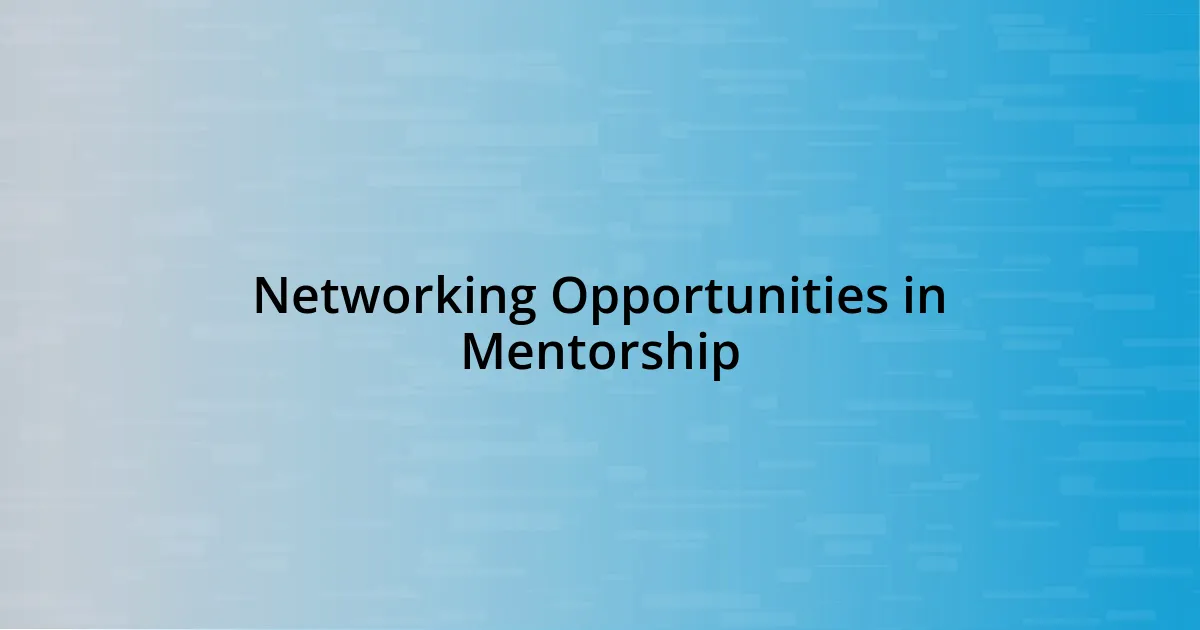
Networking Opportunities in Mentorship
Building a network through mentorship has been one of the unexpected joys I never anticipated but deeply value. Picture this: I attended a conference with my mentor, who introduced me to industry leaders and like-minded peers. Each handshake felt like a doorway opening to new possibilities. Have you ever felt that rush when you connect with someone who shares your passion? It’s invigorating, and it sets the stage for invaluable relationships.
One memory that stands out is when my mentor invited me to a roundtable discussion. Sitting among experienced professionals, I felt like an outsider at first, but I quickly realized that I was part of a unique learning environment. It was there I learned how to articulate my thoughts in a group setting, boosting my confidence. Networking isn’t just about collecting business cards; it’s about meaningful connections that can propel your career forward. Don’t you think the depth of a conversation is often more impactful than the number of connections we make?
As the months went by, I found that my network evolved into a powerful support system. These individuals became not only my mentors but also friends who truly understand my goals and aspirations. They have provided insights that shaped my career trajectory, often reaching out just to check in or share opportunities. Isn’t it comforting to know you have a community that believes in you? The relationships cultivated through mentorship aren’t just beneficial; they enrich both your personal and professional life in ways that can be genuinely transformative.
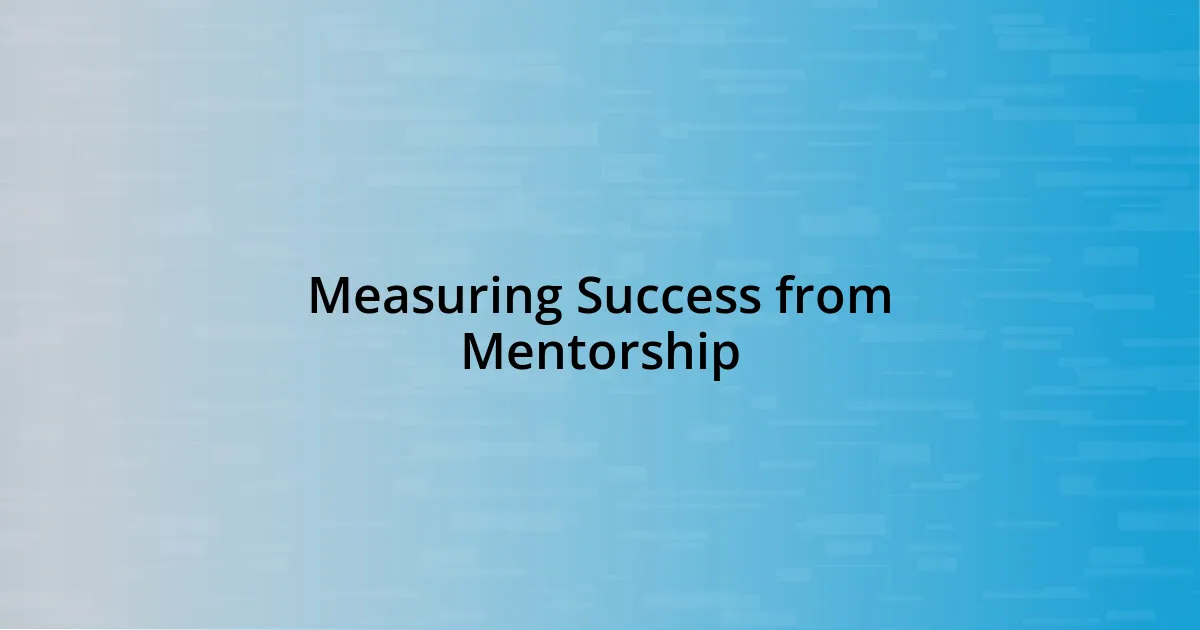
Measuring Success from Mentorship
Measuring success in mentorship goes beyond just ticking off achievements. I remember sitting down with my mentor after completing a challenging project. She asked me not just what I learned, but how I felt during the process. This reflection revealed to me that my growth wasn’t just about the skills I acquired, but also about building confidence and resilience. Have you ever reflected on how a journey made you feel, not just what you accomplished?
Another way I gauge the success of mentorship is through tangible outcomes. After months of guidance from my mentor, I secured a promotion that felt like a hard-won battle. But the real triumph wasn’t just the title—it was recognizing the strategic thinking and leadership skills I had developed along the way. Isn’t it empowering to realize that the journey shapes us as much as the destination?
Furthermore, I frequently assess the emotional and relational aspects of mentorship. When I faced setbacks, my mentor was there to offer both support and constructive advice. She emphasized the importance of resilience in the face of failure, and that insight has lingered with me. It struck me that true success in mentorship is not merely about milestones, but also about cultivating a mindset ready to tackle challenges head-on. What do you value more—the accolades or the growth that comes with overcoming obstacles?
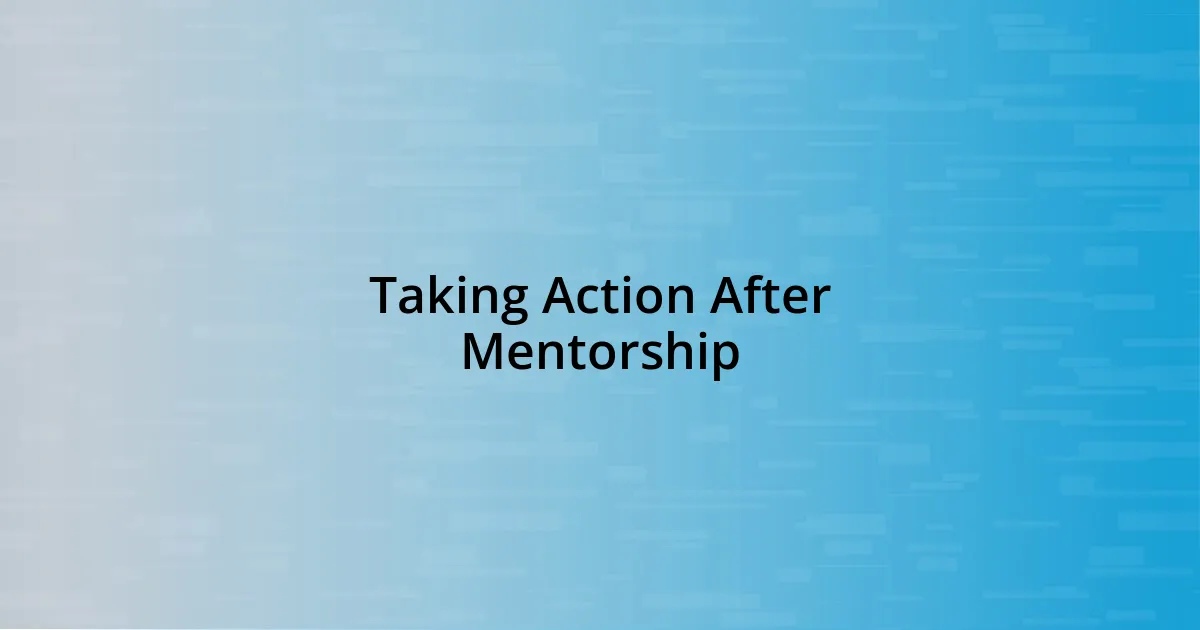
Taking Action After Mentorship
After mentorship, taking decisive action is essential for translating guidance into tangible steps. I distinctly remember the day I decided to implement a new strategy I discussed with my mentor during our sessions. It wasn’t just about following their advice; it was about believing in my own capability to create change. Have you ever had that moment when a simple idea transforms into a bold action? I felt that surge of confidence as I initiated a project that ultimately exceeded my expectations.
I also learned that setting specific goals post-mentorship can catalyze your progress. For instance, after our final meeting, I focused on applying the feedback my mentor provided to enhance my public speaking skills. Each time I presented, I could hear their encouraging voice in my mind nudging me toward improvement. Isn’t it fascinating how someone else’s belief in your potential can motivate you to strive for excellence? These milestones weren’t merely achievements; they became benchmarks that marked my evolution.
Moreover, creating a plan of action helps keep momentum alive. After my mentorship concluded, I drafted a roadmap that detailed the skills I aimed to develop in the coming months. I revisited this plan often, altering it as I encountered new challenges. Reflecting on this process, I realized that taking action isn’t just about making changes; it’s about being flexible and continuously learning. How do you ensure that the lessons you’ve gained don’t fade away? Keeping that adaptability in my approach has made all the difference.










